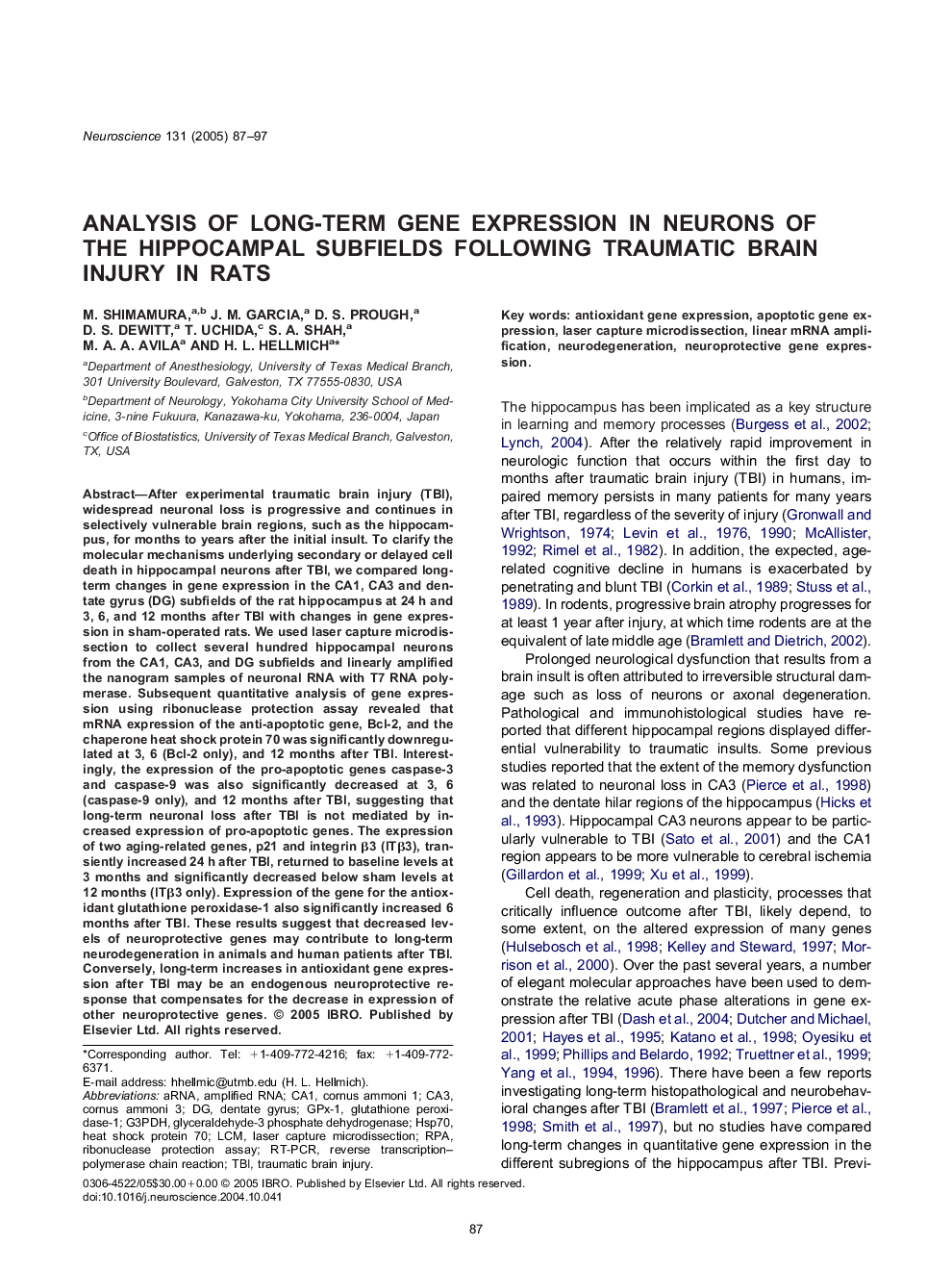| کد مقاله | کد نشریه | سال انتشار | مقاله انگلیسی | نسخه تمام متن |
|---|---|---|---|---|
| 9425970 | 1295901 | 2005 | 11 صفحه PDF | دانلود رایگان |
عنوان انگلیسی مقاله ISI
Analysis of long-term gene expression in neurons of the hippocampal subfields following traumatic brain injury in rats
دانلود مقاله + سفارش ترجمه
دانلود مقاله ISI انگلیسی
رایگان برای ایرانیان
کلمات کلیدی
CA1LCMRT-PCRGPx-1hsp70TBICA3amplified RNAaRNARPAG3PDHRibonuclease protection assay - آزمون حفاظت RibonucleaseTraumatic brain injury - آسیب تروماتیک مغزAntioxidant gene expression - بیان ژن آنتی اکسیدانNeurodegeneration - تولید نوروژنیکdentate gyrus - شکنج دندانه دارlaser capture microdissection - لیزر ضبط میکرو دیسکسیونreverse transcription-polymerase chain reaction - واکنش زنجیره ای رونویسی-پلیمراز معکوسheat shock protein 70 - پروتئین شوک حرارت 70glutathione peroxidase-1 - گلوتاتیون پراکسیداز-1glyceraldehyde-3 phosphate dehydrogenase - گلیسرالیدید-3 فسفات دهیدروژناز
موضوعات مرتبط
علوم زیستی و بیوفناوری
علم عصب شناسی
علوم اعصاب (عمومی)
پیش نمایش صفحه اول مقاله

چکیده انگلیسی
After experimental traumatic brain injury (TBI), widespread neuronal loss is progressive and continues in selectively vulnerable brain regions, such as the hippocampus, for months to years after the initial insult. To clarify the molecular mechanisms underlying secondary or delayed cell death in hippocampal neurons after TBI, we compared long-term changes in gene expression in the CA1, CA3 and dentate gyrus (DG) subfields of the rat hippocampus at 24 h and 3, 6, and 12 months after TBI with changes in gene expression in sham-operated rats. We used laser capture microdissection to collect several hundred hippocampal neurons from the CA1, CA3, and DG subfields and linearly amplified the nanogram samples of neuronal RNA with T7 RNA polymerase. Subsequent quantitative analysis of gene expression using ribonuclease protection assay revealed that mRNA expression of the anti-apoptotic gene, Bcl-2, and the chaperone heat shock protein 70 was significantly downregulated at 3, 6 (Bcl-2 only), and 12 months after TBI. Interestingly, the expression of the pro-apoptotic genes caspase-3 and caspase-9 was also significantly decreased at 3, 6 (caspase-9 only), and 12 months after TBI, suggesting that long-term neuronal loss after TBI is not mediated by increased expression of pro-apoptotic genes. The expression of two aging-related genes, p21 and integrin β3 (ITβ3), transiently increased 24 h after TBI, returned to baseline levels at 3 months and significantly decreased below sham levels at 12 months (ITβ3 only). Expression of the gene for the antioxidant glutathione peroxidase-1 also significantly increased 6 months after TBI. These results suggest that decreased levels of neuroprotective genes may contribute to long-term neurodegeneration in animals and human patients after TBI. Conversely, long-term increases in antioxidant gene expression after TBI may be an endogenous neuroprotective response that compensates for the decrease in expression of other neuroprotective genes.
ناشر
Database: Elsevier - ScienceDirect (ساینس دایرکت)
Journal: Neuroscience - Volume 131, Issue 1, 2005, Pages 87-97
Journal: Neuroscience - Volume 131, Issue 1, 2005, Pages 87-97
نویسندگان
M. Shimamura, J.M. Garcia, D.S. Prough, D.S. Dewitt, T. Uchida, S.A. Shah, M.A.A. Avila, H.L. Hellmich,